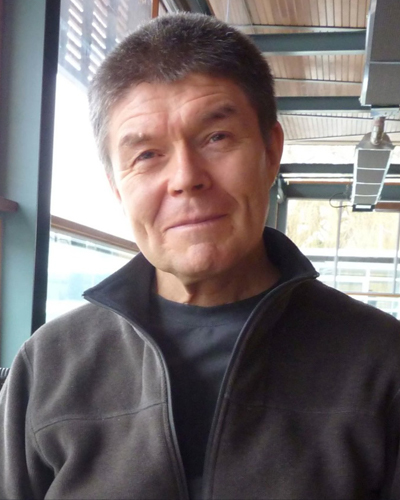Research Interests
- Indigenous ecological knowings and climate change mitigation
- Indigenous ecoliteracies and ecopedagogies
- Indigenous narrativity, orality and performativity
- Indigenous community-based research methodologies
- Global North/Global South research collaborations
- Ecojustice and sustainability education
- Indigenous agrobiodiversity
- Indigenous language regeneration
Title
Associate Professor, Indigenous Education
Biography
2000 PhD, Curriculum
Simon Fraser University
1977 BA, Honours, French, Literature, Literary Movements
University of Alberta
1975 BSc., Biological Sciences (Genetics)
University of Alberta
ámá7 sqit
I am of St’át’imc and Celtic ancestry. My community is Xáxtsa7 (Douglas First Nation), one of the eleven St’át’imc communities located in the interior plateau of British Columbia along the Fraser River, Lillooet Lake, Lillooet River and Pemberton Valley. My teaching philosophy is grounded in St’át’imc knowings and practices that are inseparably connected to the land; the land and our language are also inseparable. How we language our knowings is of key importance. Our knowings are complex, dynamic, holistic and learned intergenerationally through story, ceremony, observation and lived experience since time immemorial.
My teaching has focused primarily on four intertwined strands:
- Indigenous knowledges and practices as equivalent epistemologies in the academy and beyond
- Indigenous narrativity, orality and performativity
- Ecojustice and sustainability education
- Indigenous community-based research methodologies
The aim of my teaching is to animate thinking (and acting) in a variety of ways across philosophical, cultural, social, linguistic and geographical differences, learning to ‘read’ the world other/wise so that each of us is able to engage in respectful, ethical, culturally relevant and reciprocal conversations in rethinking the myriad textures, shapes and local/global contexts of ‘place’ within and across species. With the world on fire, I encourage students to become aware of their individual and collective ecological and ethical footprints and symbiotic relationships/responsibilities for walking lightly and respectfully on the Earth.
Invited Presentation
RECENT KEYNOTES/ADDRESSES
Cole, P., & O’Riley, P. (2022). Panel presentation. Navigating International Research Partnerships. Office of Research in Education, Faculty of Education, UBC.
Cole, P., & O’Riley, P. (2021). Keynote address. Ecojustice literacies, post-capitalist pedagogies & Indigeneity. Whisperings from Peru. Institute for Environmental Learning, SFU, Burnaby, BC..
Cole, P., & O’Riley, P. (2020). Plenary speaker. Ecojustice and Indigeneity: Conversing with human and more-than-human voices in tropical and temperate rainforests. 14th International Conference on Religion & Spirituality in Society: Conservation, Environmentalism, and Stewardship—Ecological Spirituality as Common Ground. UBC Robson Centre, Vancouver, BC.
Cole, P. (2020). Keynote address. Research ethics and protocols on Indigenous lands. Place & Space, 7th Education Graduate Students (EGS) Conference, UBC, Vancouver, BC.
Cole, P. (2020). Panel presentation. Sustainability Development Goals (SDGs), Indigenous Perspectives, Sustainability Ambassadors Program, UBC Sustainability Initiative. UBC, Vancouver, BC.
Selected Publications
Books
Cole, P. (2006). Coyote and Raven go canoeing: Coming home to the village. Montréal, QC: McGill-Queen’s University Press (Native and Northern Series).
Agyeman, J., Cole, P., Haluza-DeLay, R. & O’Riley, P. (Eds.). (2010). Speaking for ourselves: Environmental justice in Canada. Vancouver, BC: UBC Press.
Journal Articles
Cole, P. (2024). Punctuating musical diacritics of water in cross-species contexts. In Education, 29(3), 117-131. https://journals.uregina.ca/ineducation/article/view/818
Cole, P. & O’Riley, P. (2020). Indigenous ecojustice narratives in an era of climate change and pandemics. The International Journal of Environmental, Cultural, Economic & Social Sustainability: Annual Review, 16(2), 61-80.
Cole, P., & O’Riley, P. (2017). Performing survivance: (Re)Storying STEM education from an Indigenous perspective. Critical Education, 8(15), 24–40.
Cole, P. (2017). An Indigenous research narrative: Ethics and protocols over time and space. Qualitative Inquiry, 23(5), 343-351.
Cole, P., & O’Riley, P. (2010). Coyote and Raven (p)re-visit environmental education, sustainability and run-away capitalism. Canadian Journal of Environmental Education. 15, 28-50.
Cole, P., & O’Riley, P. (2008). Coyote, Raven, mathematics and complexity. Complicity: An International Journal of Complexity and Education, 5(1),49-62.
Cole, P. (2006). language as technology in indigenous culture. AlterNative: An International Journal of Indigenous Scholarship, 1, 152–167.
Cole, P., & O’Riley, P. (2005). Coyote and Raven talk about the business of education or how did Wall Street Bay Street and Sesame Street get into the pockets of publicly funded universities or vice versa? Workplace: A Journal of Academic Labor, 7(1), 15–28.
Cole, P. (2004). Trick(ster)s of Aboriginal research: or how to use ethical review strategies to perpetuate cultural genocide. Native Studies Review, 15(2), 7–30.
Cole, P. (2002). aboriginalizing methodology: considering the canoe. International Journal of Qualitative Studies in Education, 15(4), 447–459.
Book Chapters
Cole, P., & O’Riley, P. (2024). Resonances and re-entanglements in an era of climate change: Performing reciprocity with the cosmos. In N. Rallis, K. Morimoto, M. Sorensen, V. Triggs & R. L. Irwin (Eds.), Ecopedagogical and a/r/tographical walking: Kinship, nature, and relationality (pp. 189-198). Intellect. https://www.intellectbooks.com/walking-as-art-education
Cole, P., & O’Riley, P. (in press).A research chat with Coyote & Raven: Equivalency of worldviews, epistemologies and methodologies. In G. Dei (Ed.),International Handbook/Reader on Indigenous Philosophies and CriticalEducation. New York, NY: Peter Lang Publishing.
Cole, P., & O’Riley, P. (2010). Coyote and Raven talk about equivalency of other/ed knowledges in research. In P. Thomson & M. Walker (Eds.), The Routledge doctoral student’s companion: Getting to grips with research in education and the social sciences (323-334). New York, NY: Routledge Press.
O’Riley, P., & Cole, P (2009). Coyote and Raven talk about the land/scapes. In M. McKenzie, H. Bai, P. Hart & B. Jickling (Eds). Fields of green: Re-storying education. Cresskill, NJ: Hampton Press.
Cole, P. & O’Riley, P. (2003). Much rez adieux about (Dewey’s) goats in the curriculum: Looking back on tomorrow yesterday. In W. E. Doll, Jr. & N. Gough (Eds.), Curriculum Visions (pp. 144–164). New York: Peter Lang Publishing.
Conference & symposium organizer
Conference Co-Chair
2019, January
15th International Conference on Environmental, Cultural, Economic and Social Sustainability.
On Sustainability Research Network / EDCP, UBC
Location: Robson Square, Vancouver, BC
https://onsustainability.com/about/history/2019conference
- 285 participants from 35 countries.
- First time sessions were accepted in Spanish to encourage Global North/Global South networking and alliances.
Recent Research
Performing Survivance: More-than-human Intelligences and Ecological Sustainability
2015–2019
Principal Investigator
SSHRC (Social Sciences and Humanities Research Council of Canada) Insight Grant.
Undergraduate Courses
Undergraduate Courses (NITEP, Native Indian Teacher Education Program)
EDUC 441: Indigenous Epistemology
Undergraduate/Graduate Courses (Peru Summer Institute)
EDCP 467A/EDCP 585C: Ecology, Technology and Indigeneity in the High Amazon
EDCP 467B/585E: Narrativity, Indigeneity and Ecopedagogy in the High Amazon
Graduate Courses
EDCP
EDCP 508: Research Methodology in Cross-Cultural and Global Contexts
EDCP 532: Theories and Dimensions of Place-based, Ecohumanist, Critical and Indigenous Lenses
EDCP 539: Narrativity, Ecopedagogy and Indigeneity
EDCP 562: Curriculum Issues and Theories: Ecojustice and Sustainability Education Focus
EDCP 585: Ecojustice Literacies, Post-capitalist Pedagogies and Indigeneity in an Era of Climate Change
EDUC 500: Introduction to Research Methodology
EDST
EDST 508: Review of Research in Educational Studies: Researching with Indigenous Peoples
CCFI
CCFI 565: Aboriginalizing Methodology: Researching with Aboriginal Peoples
CCFI 601: Doctoral Seminar: Indigenizing Methodology
MEd Cohort
Co-Advisor (2014- 2016)
MEd in Curriculum Studies (EJS1) – Ecojustice, Sustainability & Indigeneity in Education
International Summer Institutes (Peru)
Co-Director (2013; 2015; 2017)
Peru Summer Institute: Ecology, Technology and Indigeneity in the High Amazon
Location: Lamas, Peru
- offered through EDCP and UBC Go Global
- six (6)-credit experiential learning program consisting of two (2) undergraduate/graduate courses and immersion/service learning at the Sachamama Center for BioCultural Regeneration and in local Indigenous Kichwa communities


